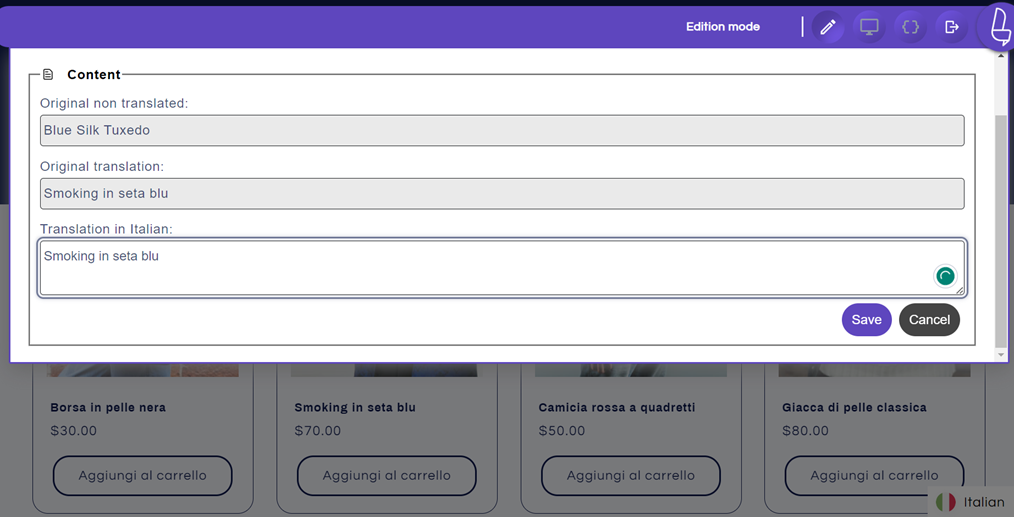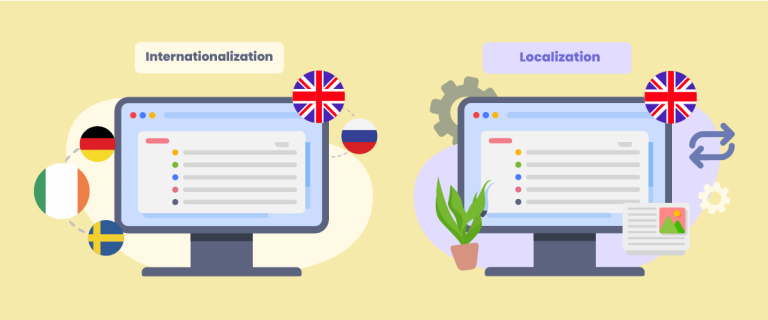Glocal (global-localized) marketing is all around us, shaping how global brands connect with local audiences. Take Netflix, for example – it doesn’t just offer the same content everywhere. Instead, it curates shows that suit specific regions, such as K-dramas for South Korea and Bollywood movies for India, thus ensuring its library resonates with local audiences.
Glocal marketing is not just about customizing products, but also about understanding local behavior, language, and cultural nuances. Businesses must strike a balance between global brand identity and localized messaging, which is not always easy. This article discusses why glocal marketing is so important, the challenges, and how businesses can implement it successfully to drive customer engagement.
What is glocal marketing?

Glocal marketing is a strategy that allows businesses to expand globally while staying relevant to local audiences. The term itself is a blend of “global” and “local,” reflecting the balance brands must strike between maintaining a consistent identity and adapting to cultural differences. In essence, glocal marketing means tailoring products, services, and marketing campaigns to fit the unique preferences, languages, and traditions of different regions while keeping the core brand message intact.
Think of how Netflix curates its content differently depending on the country. A user in Japan might see a homepage filled with anime recommendations, while someone in Korea gets suggestions for K-Drama. This is a prime example of glocal marketing—the brand remains the same, but the experience feels local. Similarly, fast-food chains, fashion brands, and even tech companies adjust their products and messaging to suit regional expectations, ensuring they connect with audiences worldwide.
However, glocal marketing is not the same as local marketing. Local marketing focuses solely on reaching customers within a specific area, often based on proximity, like a coffee shop promoting discounts to nearby residents. Glocal marketing, on the other hand, is about adapting a global brand’s presence for different cultural contexts, whether in different countries or diverse communities within the same country. This approach helps businesses expand their reach while ensuring their messaging remains relevant and relatable to local consumers.
Why glocal marketing matter in modern business?

Glocal marketing is more than just a strategy—it’s a necessity for businesses aiming to expand internationally. Here are some reasons why glocal marketing matters to your business.
Expansion into new markets
When companies enter new markets, they must adapt their strategies to fit the unique cultural and consumer preferences of each region. A well-executed glocal marketing strategy helps brands gain acceptance in these new markets by speaking directly to local audiences in ways that resonate with them.
Brand reputation and consumer trust
Glocal marketing also helps improve a brand’s reputation by demonstrating that it understands and respects local cultures. When companies take the time to localize their marketing campaigns, consumers feel that the brand values their customs and needs, leading to greater trust and loyalty. A brand that incorporates local preferences into its messaging is more likely to form lasting relationships with its audience, which can contribute to long-term success in the market.
Cost-effectiveness in marketing strategy
Lastly, this makes the marketing process more efficient and cost-effective. Companies can save resources by avoiding the need to invent new campaigns from scratch for every region, and instead focus on adapting existing content. This approach allows for consistency in brand messaging while still catering to the diverse needs of different markets, ultimately optimizing marketing efforts and reducing unnecessary expenditures.
Challenges in glocal marketing and how to overcome them

Glocal marketing can be incredibly effective, but it comes with its own set of challenges. Understanding these challenges and knowing how to address them is key to successfully navigating global markets. Here are some of the common challenges and how you overcome them.
Cultural differences and consumer preferences
One of the biggest challenges in glocal marketing is understanding and respecting cultural differences. Consumers from different regions have unique preferences, traditions, and values, and what works in one market may not work in another. For instance, certain symbols, colors, or even humor may be seen differently depending on the culture.
To overcome this, businesses should invest in local market research to better understand these cultural nuances and adapt their campaigns accordingly. Working with local experts can also help ensure that marketing content resonates with the audience without unintentionally offending or alienating them.
Difficulty in maintaining brand consistency
While adapting to local cultures is important, maintaining a consistent brand identity across different markets is equally crucial. The challenge lies in finding the right balance between localization and brand consistency. A brand should have a recognizable voice, mission, and image, even when tailoring its message to fit different regions.
To solve this, businesses should develop clear brand guidelines that allow flexibility for localization, ensuring the core brand message remains intact while still catering to local preferences. Regular communication across global teams can help keep the brand cohesive and aligned with its values.
Language barriers and inaccurate translations
Language can be a huge barrier in glocal marketing, especially if translations are not done accurately. Poor translation can lead to misunderstandings or even cause offense. This issue is especially critical in countries where nuances and idiomatic expressions matter.
To overcome this challenge, businesses should use the best automatic translation services and employ native speakers who understand the local language and cultural context. Additionally, reviewing translations with local experts can help ensure the messaging is both accurate and culturally appropriate, minimizing the risk of costly mistakes.
Different SEO strategies in different countries
SEO strategies that work in one country may not be as effective in another due to varying search engine behaviors, local search terms, and algorithms. For example, Google is the dominant search engine in many countries, but in China, Baidu takes the lead.
To navigate this challenge, businesses should tailor their SEO strategies to each market by conducting keyword research specific to that region and adapting content accordingly. It’s also important to localize website structure, meta tags, and even domain names to enhance search visibility. Collaborating with SEO experts in each market will ensure that your global presence is optimized for local search engines, driving more traffic and improving your visibility in diverse regions.
How to implement glocal marketing?
Here are some steps to help you start and successfully implement a glocal marketing strategy.
#1 Identifying country target

The first step in crafting an effective glocal marketing strategy is recognizing the unique cultural dynamics within your target market. Understanding how different cultures approach communication, decision-making, and behavior can help you anticipate challenges and tailor your strategy accordingly.
Key questions such as “What is the market size in this country?” and “Does a significant portion of the population align with our target demographics?” are essential for defining your approach. Additionally, it’s crucial to understand what languages are spoken in the country, as well as cultural nuances. Localization goes beyond language; cultural differences in aspects like color perceptions, symbolism, or humor can vary greatly from one culture to another. For instance, humor that resonates in France might not work in Germany, and color preferences or symbolism can differ significantly between Western cultures and Eastern.
#2 Create the strategy and localized your marketing
Once you’ve gained insights into local preferences, it’s time to create a tailored strategy that resonates with each region. This doesn’t just mean translating your content but adjusting your tone, imagery, and even the product offering to match local tastes. For example, McDonald’s famously offers different menu items in various countries, like the McSpicy Paneer in India or the Teriyaki Burger in Japan. This strategy helps create a stronger emotional connection with the local market by acknowledging their unique preferences.
Localization goes beyond just content translation; it should be reflected in every aspect of your marketing efforts, including the design of your website, social media campaigns, and even customer service. To achieve this, you’ll need to hire experts who understand the region’s cultural context and consumer behavior to ensure your content is both effective and respectful of local norms.
In crafting your strategy, ensure you address the following:
- Understand typical purchasing habits, payment preferences (e.g., credit card, mobile wallets, cash on delivery), and shopping tendencies (online vs. in-store).
- Research the dominant social media platforms in the region and how people interact with them (e.g., Facebook, Instagram, WeChat).
- Know which media channels (TV, radio, online, etc.) are most popular for reaching the target audience.
- Consider the region’s technological advancement and the types of devices (smartphones, tablets, desktops) used by your target audience.
These insights are crucial because they directly affect how your marketing campaigns should be structured. Understanding local purchasing behavior, social media engagement, and technology usage ensures your campaign is effectively localized, aligning with the preferences and habits of your potential customers in each market.
#3 Optimized international SEO

One of the biggest challenges of glocal marketing is optimizing your website for international SEO. While you might have a great website for your home country, it’s essential to adapt it for international audiences. Start by optimizing your content for search engines used in other regions—like Baidu in China or Yandex in Russia. Additionally, using localized keywords and ensuring that your website’s structure supports multiple languages is crucial for better visibility in international search results.
Other important elements of international SEO include:
- Localized keywords: Research and integrate region-specific keywords, considering local language nuances, slang, and common search behaviors.
- URL structure: Make sure your URLs reflect the local market—whether that’s through subdirectories like example.com/uk for the UK or creating country-specific domains.
- Hreflang tags: Implementing hreflang tags helps search engines understand which version of the page to show based on the user’s language or location, improving your site’s SEO performance across different regions.
- Multilingual content: Ensure your website has quality, localized content in the native language of your target market to improve relevance and engagement.
- Page load speed: Optimize your website’s speed for international audiences, as performance may vary depending on the region’s internet infrastructure.
By optimizing these aspects, you can ensure that your website ranks well on search engines in each target market, helping your business gain better visibility and attract more local customers.
#4 Hire local professional
When venturing into new markets, it’s important to hire local professionals who can help guide your marketing efforts. Local marketers and cultural experts can provide valuable insights into what works in that specific region and help avoid mistakes that could arise from a lack of cultural understanding. For instance, a marketing campaign that works well in the U.S. may completely flop in a market like the Middle East due to cultural differences.
By hiring local talent, whether in marketing, content creation, or customer service, you ensure that your campaigns are more relevant and resonate with the target audience. They can also assist in adapting your global brand image in a way that feels authentic to local customers, making your brand more approachable and trusted in the new market.
Additionally, hiring native speakers is crucial for ensuring that your content is not only linguistically accurate but also culturally appropriate. Native speakers can help with:
- They ensure that your messaging is culturally sensitive and contextually relevant, avoiding misinterpretations that could damage your brand’s image.
- Local content creators can craft messages that align with the cultural values, humor, and communication style of the target audience, leading to better engagement.
- Native professionals can help you adapt your product offerings, website design, and promotional materials to feel authentic and resonate with local customers.
Hiring native professionals enhances the overall effectiveness of your marketing strategy by ensuring authenticity, accuracy, and relatability in every aspect of your campaign.
#5 Translate content with high quality

Content translation is often the first step businesses take when localizing their marketing efforts, but it’s important to ensure that the translation is accurate and culturally appropriate. Poor translations can harm a brand’s reputation and lead to misunderstandings. It’s essential to work with professional translators who not only understand the language but also the local culture. For example, a humorous phrase in one language may be offensive in another, so professional translators can help navigate these complexities.
Moreover, translating your website, blog, or marketing materials with high quality will ensure that the messaging aligns with local nuances and retains its effectiveness across different languages. Investing in human translators, rather than relying solely on machine translation, can significantly enhance the quality and relevance of your content in each target market.
It’s also crucial to select high-quality translation tools that not only provide accurate translations but also allow you to edit translations to align with local preferences. Some tools, such as Linguise automatic translation website, automatically implement multilingual SEO best practices and provide the flexibility to adjust translations for local contexts. These tools enable you to refine your content further, ensuring it resonates with your audience while improving your SEO performance in different markets.

Conclusion
Glocal marketing is important for businesses to connect with local audiences while maintaining a global brand presence. By understanding and adapting to local cultural nuances, preferences, and behaviors, brands can enhance customer engagement and ensure that their marketing efforts resonate across diverse regions. Implementing a successful glocal marketing strategy is a balancing act, but when done right, it drives long-term growth, fosters brand loyalty, and elevates customer satisfaction.
To optimize your glocal marketing efforts, it’s essential to choose tools that offer high-quality translations, allow for cultural customization, and integrate international SEO. Linguise is a perfect solution to help businesses succeed in their global-local marketing journey. Try Linguise for the best glocal marketing experience and take your brand to the next level!




